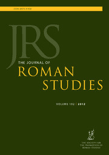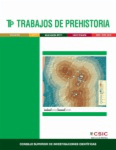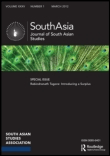
Archipel-Etudes interdisciplinaires sur le monde insulindien
Scope & Guideline
Illuminating the Intersections of Culture and History
Introduction
Aims and Scopes
- Interdisciplinary Historical Research:
The journal emphasizes historical analysis, covering various periods and events in Southeast Asia, particularly in the Insulindian region, from colonial times to contemporary issues. - Cultural and Social Dynamics:
There is a significant focus on cultural studies, examining the interactions and exchanges among different ethnic groups, religions, and social structures within the region. - Colonial and Post-Colonial Studies:
The journal presents critical insights into the impacts of colonialism and the subsequent transformations in societal structures, identities, and power dynamics. - Linguistic and Literary Analysis:
Research often encompasses linguistic studies and literary reviews, highlighting the role of language and literature in shaping cultural and national identities. - Material Culture and Heritage:
The journal explores aspects of material culture, including architecture, textiles, and artifacts, providing a comprehensive view of the region's historical and contemporary significance.
Trending and Emerging
- Contemporary Religious Discourse:
Recent publications increasingly address the role of religion in modern Indonesian society, particularly how religious narratives intersect with politics and identity. - Migration and Mobility Studies:
There is a growing interest in examining migration patterns, cross-border marriages, and their socio-cultural implications, highlighting the complexities of identity and belonging in a globalized world. - Environmental and Disaster Studies:
Research focusing on environmental issues, disaster management, and their socio-cultural impacts has gained traction, reflecting global concerns and local realities in the face of climate change. - Digital Humanities and Archival Studies:
Emerging methodologies in digital humanities, particularly in relation to archival research and the use of digital tools for historical analysis, are becoming increasingly prominent. - Cross-Cultural Exchanges:
The journal is seeing a rise in studies that explore cross-cultural exchanges between different ethnic groups in Southeast Asia, emphasizing interconnected histories and cultural dialogues.
Declining or Waning
- Traditional Ethnographic Studies:
There has been a noticeable decrease in traditional ethnographic approaches, which previously focused heavily on indigenous practices and lifestyles, as researchers now lean towards more contemporary issues and interdisciplinary methodologies. - Nationalism and Identity Politics:
Themes centered around nationalism and identity politics, particularly in the context of nation-building narratives, are less frequently explored, possibly due to a growing focus on transnational and global perspectives. - Historical Biographies of Lesser-Known Figures:
The publication of biographies or detailed studies on lesser-known historical figures has diminished, with a shift towards broader thematic analyses and collective histories.
Similar Journals

Cuadernos CANELA
Exploring the Intersection of Religion and CultureCuadernos CANELA is a distinguished scholarly journal published by Nanzan University and the Nanzan Institute for Religion and Culture, focusing on the interdisciplinary study of religion and culture. Operating under an Open Access model since 2012, this journal aims to foster global dialogue and accessibility in research, catering to a diverse audience of researchers, professionals, and students. With an emphasis on quality and scholarly rigor, Cuadernos CANELA plays a significant role in advancing the field by providing a platform for innovative ideas and critical discussions that address complex cultural and religious phenomena. As a journal dedicated to expanding knowledge within the intersection of religion and cultural studies, it invites contributions that explore these themes from various geographical and disciplinary perspectives. For more information on submission and access options, please visit our website.

Journal of Early Modern History
Pioneering Interdisciplinary Dialogue in Early ModernityJournal of Early Modern History, published by BRILL, is a premier academic journal dedicated to the exploration and analysis of early modern history, encompassing a broad range of interdisciplinary studies from 1450 to 1800. With an ISSN of 1385-3783 and an E-ISSN of 1570-0658, this journal serves a global community of historians, researchers, and students, providing an invaluable platform for the dissemination of new research and scholarly dialogue. The journal, which is based in the Netherlands, boasts a solid Scopus rank of #536 out of 1760 in the Arts and Humanities - History category, placing it in the 69th percentile, and it holds a respectable Q3 quartile ranking as of 2023. The objectives of the journal include fostering innovative historical scholarship and engaging with the methodological challenges of the field, making it an essential resource for those dedicated to the study of early modernity. Although it is available through conventional subscription models, its impact on the historiographical landscape is significant, paving the way for future research and critical discourse in a vital period of history.

Cartagine-Studi e Ricerche
Connecting scholars to reshape our understanding of history.Cartagine-Studi e Ricerche is a distinguished academic journal published by UNIV STUDI CAGLIARI, dedicated to advancing the fields of Archaeology, Classics, and History. With an Open Access format since its inception in 2016, this journal ensures that scholarly research is freely available to a global audience, fostering knowledge dissemination and collaboration among researchers, professionals, and students. Based in Italy, it occupies a vital place in the academic community, holding a Q3 ranking in each of its categories for 2023, showcasing its relevance and impact in the disciplines it covers. Scopus rankings further validate its quality, with impressive percentiles reflecting its significant contributions to the landscape of arts and humanities. Spanning converged years from 2019 to 2024, Cartagine-Studi e Ricerche serves as a crucial resource for those engaged in the study of ancient cultures and historical contexts, inviting innovative research and critical discussions that shape our understanding of the past.

CAMBRIAN MEDIEVAL CELTIC STUDIES
Exploring the Heart of Medieval Celtic HeritageCambrian Medieval Celtic Studies is a distinguished academic journal dedicated to the exploration and analysis of the rich cultural, historical, and linguistic heritage of the Celtic regions during the medieval period. Published by the Department of Welsh at the University of Aberystwyth in the United Kingdom, this journal serves as a vital platform for scholars and researchers in the fields of archaeology, history, linguistics, and literary studies. With its ISSN 1353-0089, the journal has been operational since 2002, delivering valuable insights and fostering scholarly discourse up to the present, with plans for future publications extending to 2024. Although currently categorized in the Q4 quartile across various relevant fields, Cambrian Medieval Celtic Studies remains committed to enhancing the understanding of medieval Celtic culture through rigorous research and peer-reviewed content. Researchers and students alike will find this journal an essential resource for advancing their studies in these dynamic fields, as it provides open access to a wealth of interdisciplinary perspectives in the arts and humanities.

JOURNAL OF ROMAN STUDIES
Connecting Past and Present in Roman StudiesThe JOURNAL OF ROMAN STUDIES, published by Cambridge University Press, is a prestigious academic journal dedicated to the exploration of the Roman world through archaeological, historical, and literary lenses. With a rich publication history dating back to 1911, this journal has established itself as a leading platform for groundbreaking research in the fields of Classics, History, and Visual Arts, holding Q1 rankings in multiple categories as of 2023. Scholars from around the globe rely on its rigorous peer-reviewed articles to inform their work and advance the understanding of Roman culture and society. Although it operates under a traditional access model, the journal's impact factor and broad bibliographic reach ensure that it remains an invaluable resource for researchers, students, and professionals alike. With its continued commitment to excellence, the JOURNAL OF ROMAN STUDIES not only contributes to academic discourse but also invites new insights into the timeless relevance of Roman studies.

Trabajos de Prehistoria
Connecting Scholars Worldwide to Unravel the Mysteries of Human HistoryTrabajos de Prehistoria is a distinguished peer-reviewed journal published by the Consejo Superior de Investigaciones Científicas (CSIC) since 1988, and it has established itself as a vital resource in the field of archaeology and prehistory. With an impressive impact factor and an open access policy, the journal aims to disseminate high-quality research that contributes to the understanding of human history and prehistorical studies. This Spanish journal has consistently ranked in the top quartile (Q1) in both the Arts and Humanities and Social Sciences categories, reflecting its significance in advancing archaeological scholarship, with Scopus rankings placing it in the 85th percentile among its peers. Covering a broad scope of topics related to archaeology, it serves as a platform for innovative research that connects researchers, professionals, and students globally, enhancing academic dialogue and fostering interdisciplinary collaboration. Based in Madrid, European researchers and global academics alike benefit from its open access model, promoting wider distribution and accessibility of foundational studies in the field.

Quaestio Rossica
Fostering Inclusive Scholarly DiscourseQuaestio Rossica is a prestigious academic journal published by URAL FEDERAL UNIVERSITY that focuses on a broad spectrum of the humanities, encompassing cultural studies, history, linguistics, literature and literary theory, as well as visual and performing arts. With an Open Access model since 2021, it provides unrestricted access to high-quality research articles, fostering a more inclusive platform for scholarly discourse. The journal has notably achieved Q1 rankings in key categories such as Cultural Studies and Literature and Literary Theory, highlighting its impact and relevance. With a commitment to advancing interdisciplinary dialogue, Quaestio Rossica serves as an essential resource for researchers, professionals, and students interested in exploring the rich complexities of human culture and expression. Based in the Russian Federation, it aims to bridge gaps in knowledge across various linguistic and cultural contexts, making its contribution invaluable in today's increasingly globalized academic landscape.

ZEITSCHRIFT DER DEUTSCHEN MORGENLANDISCHEN GESELLSCHAFT
Unveiling Historical Contexts in a Globalized WorldZEITSCHRIFT DER DEUTSCHEN MORGENLANDISCHEN GESELLSCHAFT is a distinguished academic journal published by Harrassowitz Verlag, prominently situated in Germany. With ISSN 0341-0137, it serves as a critical forum for scholars engaged in the fields of Cultural Studies and History. The journal has carved out its niche in the academic community with its Q3 ranking in both disciplines as of 2023, reflecting its commitment to fostering in-depth research and discussions that illuminate various historical and cultural contexts. Despite its current positioning in the lower quartiles, the journal has a specific focus on the interaction between Eastern and Western cultures, thus appealing to researchers, professionals, and students alike who are keen on exploring new insights in a globalized world. While the journal is not open access, it remains an essential resource for those aiming to deepen their understanding of cultural interrelations and historical developments from a German perspective. For further inquiries, the journal can be contacted at its address: Kreuzberger Ring 7B-D, Wiesbaden 65174, Germany.

Journal Asiatique
Bridging Cultures Through Critical AnalysisJournal Asiatique, published by PEETERS, is a distinguished academic journal based in Belgium with an ISSN of 0021-762X and an E-ISSN of 1783-1504, specifically serving the fields of Cultural Studies, History, Linguistics, and Literature. With a significant impact factor reflected through its categorization in the Q3 quartile for Cultural Studies, History, and Linguistics, and Q2 in Literature and Literary Theory, the journal provides a vital platform for scholarly discourse, encouraging researchers, professionals, and students to contribute to the evolution of these intertwined domains. The journal covers diverse aspects of Asian studies, including cultural, historical, and linguistic perspectives, and has been actively publishing since its establishment. While it does not offer an open-access option, the journal remains an esteemed resource for academic exploration and critical analysis, helping to elevate and disseminate knowledge within its vibrant community.

SOUTH ASIA-JOURNAL OF SOUTH ASIAN STUDIES
Exploring the Rich Tapestry of South Asian NarrativesSOUTH ASIA-JOURNAL OF SOUTH ASIAN STUDIES, published by Routledge Journals, Taylor & Francis Ltd, stands as a seminal platform for scholarly discourse in South Asian studies. With a proud history dating back to 1971, the journal provides a comprehensive examination of the region's multifaceted cultural, historical, and socio-political dynamics. Renowned for its rigorous peer-reviewed articles, it is listed in the prestigious Q1 category in Cultural Studies and History and has garnered respect across the social sciences, indicated by its competitive rankings in Development and Sociology and Political Science. Although it does not currently offer open access, the journal's influence is evident, boasting an impressive impact in its fields as indicated by its Scopus rankings, with a noteworthy 88th percentile in History. Targeted towards researchers, professionals, and students alike, SOUTH ASIA-JOURNAL OF SOUTH ASIAN STUDIES is essential for anyone seeking to deepen their understanding of South Asian complexities and contribute to ongoing academic conversations.